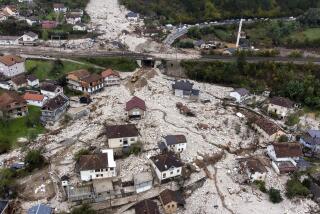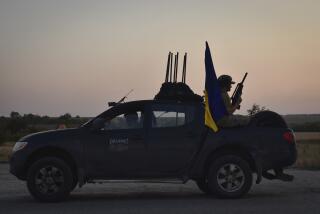Bombing of Bridge Splits Serbian Town on All Levels
- Share via
VARVARIN, Yugoslavia — Six weeks after NATO warplanes killed Sasa Pantic’s best friend, along with Milanka Marinkovic’s only son, the daughter of the leading opposition figure and seven other civilians in this small town, the forces of nature have taken over where the alliance left off.
After an airstrike that already had changed the course of thousands of lives here, flood waters this week were tearing away large chunks of Varvarin itself, washing them downstream in the raging, rain-swollen Velika Morava River. The waters also took away the remains of a 52-year-old bridge that was Varvarin’s main lifeline to the world until May 30, when NATO destroyed it--along with the 10 lives.
“It’s Armageddon,” Pantic, a 27-year-old machinist, said as he lighted a candle at a riverside church in memory of his friend and reflected on the more than 40 days and nights that began with NATO bombs, then were followed by a small earthquake and now floods.
“You try to live normally,” he said. “You try to adapt. You try to do what little you can to better your life, to survive, to change the government, to change the man who brought this on us. But now, as you see, NATO has made that more impossible than ever. Just look around this town.”
The profile of Varvarin today shows how the loss of a single steel structure and 10 people who were on it at the time can alter the life of a town for weeks, and perhaps years.
But at a time of almost daily street protests against Yugoslav President Slobodan Milosevic throughout Serbia, Varvarin also shows how NATO’s airstrikes changed the political dynamic for a wounded people who the alliance hopes will succeed where its 78-day air war failed--to drive Milosevic from power.
Among the dead that day was Sanja Milenkovic, a 15-year-old star math student and daughter of the opposition Serbian Renewal Movement’s local leader. Both father and daughter were rare voices against Milosevic in a town where the Yugoslav leader and his Socialist Party of Serbia control virtually everything.
“During the NATO bombardment of Serbia, 146 members of my party who rose up so proudly two years ago in the streets here waving American and European flags were killed by European and American bombs--including Sanja, who was just a child,” the movement’s national leader, Vuk Draskovic, said in an interview Tuesday, referring to anti-government demonstrations in 1997.
Draskovic, who announced that his party on Saturday will join the mounting anti-Milosevic street protests, said the bombing has created “anti-American and anti-European sentiment” among his once fiercely pro-U.S. supporters and has made his push for Milosevic’s resignation all the harder.
Few provide better living testimony than Sanja’s father, Zoran Milenkovic.
“My personal opinion,” he said, “is that the one to blame for destroying the bridge in Varvarin is NATO because it was done at 1 p.m. on market day, when they knew the maximum number of people would be on the bridge. But I also blame Milosevic and his regime as the principal cause of the bombing in the first place.
“I promised my daughter at her funeral that I will not rest as long as Milosevic is still alive,” he said. “But also, I vowed to her that I will bring to justice the NATO commander who ordered these airstrikes on the bridge.”
What is more, Milenkovic acknowledged that the loss of the bridge, which had linked the lives and livelihoods of nearly all 3,500 residents, has brought significant short-term gains to the town’s pro-Milosevic officials. “They have everything,” he said of the ruling party’s control of jobs and resources, “and we have nothing.”
Socialist Party Mayor Dragan Cabric and Deputy Mayor Milija Milonovic won high marks here for quick, creative moves to reconnect the two riverbanks in Varvarin--at least temporarily.
Mobilizing state workers at the government’s local heavy-machinery plant, they built a barge in just 20 days, strung a rope across the 500-yard-wide river and launched a 24-hour commuter service capable of carrying as many as four cars and 30 people per trip.
The barge, Cabric and others in town said, was vital: Farmers who live on Varvarin’s left bank were cut off from their pepper and tomato crops on the other side just at the height of the harvest; factory workers on the left bank no longer could commute to their jobs in cities and towns far beyond the other side; and extended families who straddle the river had been out of touch throughout the final weeks of NATO’s bombing campaign.
“Our entire economy was connected to that bridge,” said Cabric, 43, a committed pro-Milosevic Socialist who studied military affairs. “All exports, all imports, all commuters, all farmers, everyone depended on that bridge. And everyone thanked us when we got the barge on line.”
Then came the floods. Torrential rains last weekend ruined hundreds of acres of crops and sent surging waters down the Velika Morava and a small tributary that runs behind the town, wiping out three smaller bridges on the tributary and rendering the new barge useless.
“I estimate it will take about 10 days for the river to calm down enough to use the barge again,” said Milonovic, the deputy mayor. “And for this the people will blame NATO.”
A 59-year-old regime hard-liner, Milonovic said he believes that the U.S. government is behind the rains--”the CIA can now wage weather wars,” he said--and he attributed last month’s earthquake, which shook the town but did no serious damage, to a seismic device based in Alaska capable of creating such tremors whenever and wherever the U.S. wishes.
Local officials added that Yugoslavia’s new Ministry of National Reconstruction has promised to rebuild the Varvarin bridge by Nov. 1, part of a massive effort that Milosevic has vowed will replace by that date all 60 bridges bombed by the North Atlantic Treaty Organization in Serbia, Yugoslavia’s main republic.
But looking back on the local efforts so far--including a slick, four-page, Serbian-language brochure on the bridge’s destruction, which the mayor’s office produced to raise reparation funds from Serbs living abroad--Cabric is confident that he still holds public support. “For what I have done as mayor, I expect 80% of the people will again vote for me,” he said.
Sasa Pantic isn’t among them. For the unemployed machinist, the biggest loss from the bridge bombing--after the death of his friend--is the destruction of a psychological symbol of marginal freedom.
“The bridge was like an exit from prison for many of us young people,” said Pantic, echoing many others here who refused to be quoted by name but described Varvarin as a dictatorship in miniature.
“We can’t get a job if we don’t join the Socialist Party,” he said. “We can’t protest in the street unless we want to get beaten by the police. So our hands are tied here. This bridge linked us to opposition-minded cities like Belgrade, and now that is gone.”
As the strongest opposition leader in town, Milenkovic said he hopes to exploit such sentiment.
“I don’t believe that losing this bridge is going to help Milosevic’s people in the long run,” he said. “It’s not such a great thing to lead our people into the 21st century on a barge. Let them rebuild the bridge by Nov. 1 and then we’ll see.”
But Milanka Marinkovic, whose only son was killed by NATO bombs that day, isn’t sure whom to blame--or support.
At 50, Marinkovic is utterly alone; her husband died 11 months ago, followed by her 33-year-old son, Zoran. He was killed when he rushed to the bridge to help a victim who had been wounded during the first of two bombing runs spaced minutes apart.
“He was cut literally in two,” Marinkovic said, still clad in black and weeping beside photographs of her son. “I carried his legs.”
At first, Marinkovic said, she blamed President Clinton, adding that her Socialist Party family had supported Milosevic for a decade. But she also blames police for not keeping people off the bridge after the first bombing.
“And now, after so many mothers are in mourning and so many children have been killed, really I don’t care about the end of the war, I don’t care about Milosevic. I don’t care about Clinton,” she said.
“I only care that this bridge is never rebuilt, for my son will never walk across it again. They can build 100 bridges, and they still won’t bring my son back. For me, the only future now is to be alone and wait to die.”
More to Read
Sign up for Essential California
The most important California stories and recommendations in your inbox every morning.
You may occasionally receive promotional content from the Los Angeles Times.










